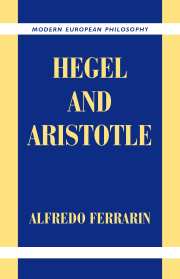Book contents
- Frontmatter
- Contents
- Acknowledgments
- List of Abbreviations
- Introduction
- PART I THE HISTORY OF PHILOSOPHY AND ITS PLACE WITHIN THE SYSTEM
- PART II LOGIC AND METAPHYSICS
- PART III ARISTOTLE AND THE REALPHILOSOPHIE
- PART IV CONCLUSIONS
- 10 Truth, Holism, and Judgment
- 11 The Pictures of Aristotle in Hegel's Formative Years
- Bibliography
- Index
10 - Truth, Holism, and Judgment
Published online by Cambridge University Press: 22 October 2009
- Frontmatter
- Contents
- Acknowledgments
- List of Abbreviations
- Introduction
- PART I THE HISTORY OF PHILOSOPHY AND ITS PLACE WITHIN THE SYSTEM
- PART II LOGIC AND METAPHYSICS
- PART III ARISTOTLE AND THE REALPHILOSOPHIE
- PART IV CONCLUSIONS
- 10 Truth, Holism, and Judgment
- 11 The Pictures of Aristotle in Hegel's Formative Years
- Bibliography
- Index
Summary
Ur-theil ist … Ur-theilung.
(F. Hölderlin, Urtheil und Seyn)The Finitude of Thinking
The concept of energeia forms for Hegel the unitary principle of Aristotle's philosophy. It is the foundation for understanding the concept of immanent form as an essence which is at the same time the cause of its being. As such, it cannot be understood apart from change but is the subject of its own function, the archê kai telos of its being. Thus Hegel thinks it as the unity of inner and outer, as a substance that is the subject of its modes.
I have argued in Part II that in Hegel's interpretation substance as actuality is not a given and fixed identity but a self-producing unity; an entelechy is the unity of a multiplicity, not a unity over multiplicity. Essence and appearance are properly related in energeia understood as a self-relating negativity, a self-motion, and thereby the totality of its inner determinations.
If properly speaking energeia is thus subjectivity, a self-referential actuosity or the actualization of the potency internal to its essence, then it is not a windowless monad but is in constant relation to its otherness. It is an innerly articulated whole which includes the negative moment of determination within itself at the same time as it relates to its otherness. Taken in general, this structure pervades and defines the whole of nature and of human subjectivity.
- Type
- Chapter
- Information
- Hegel and Aristotle , pp. 373 - 393Publisher: Cambridge University PressPrint publication year: 2001



